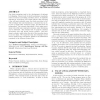Free Online Productivity Tools
i2Speak
i2Symbol
i2OCR
iTex2Img
iWeb2Print
iWeb2Shot
i2Type
iPdf2Split
iPdf2Merge
i2Bopomofo
i2Arabic
i2Style
i2Image
i2PDF
iLatex2Rtf
Sci2ools
104
click to vote
ICSE
2008
IEEE-ACM
2008
IEEE-ACM
Formal concept analysis applied to fault localization
One time-consuming task in the development of software is debugging. Recent work in fault localization crosschecks traces of correct and failing execution traces, it implicitly searches for association rules which indicate that executing a line will most probably cause the whole execution to fail. This technique has some limitations: it assumes that an error has a single faulty statement origin, and that lines are independent. Our research hypothesis is that using association rules with more expressive premises, some limitations can be alleviated. The solution that we propose combines association rules and formal concept analysis. Our technique is already usable when the size of the execution traces is not too large. We conjecture that the technique can be used to analyze large executions, thanks to the information d in the Abstract Syntax Tree. Categories and Subject Descriptors D.2.5 [Software Engineering]: Testing and Debugging-Debugging aids; H.3.3 [Information Storage and Retriev...
Association Rules | Formal Concept Analysis | ICSE 2008 | Localization Crosschecks Traces | Software Engineering |
Related Content
| Added | 09 Dec 2009 |
| Updated | 09 Dec 2009 |
| Type | Conference |
| Year | 2008 |
| Where | ICSE |
| Authors | Peggy Cellier |
Comments (0)

